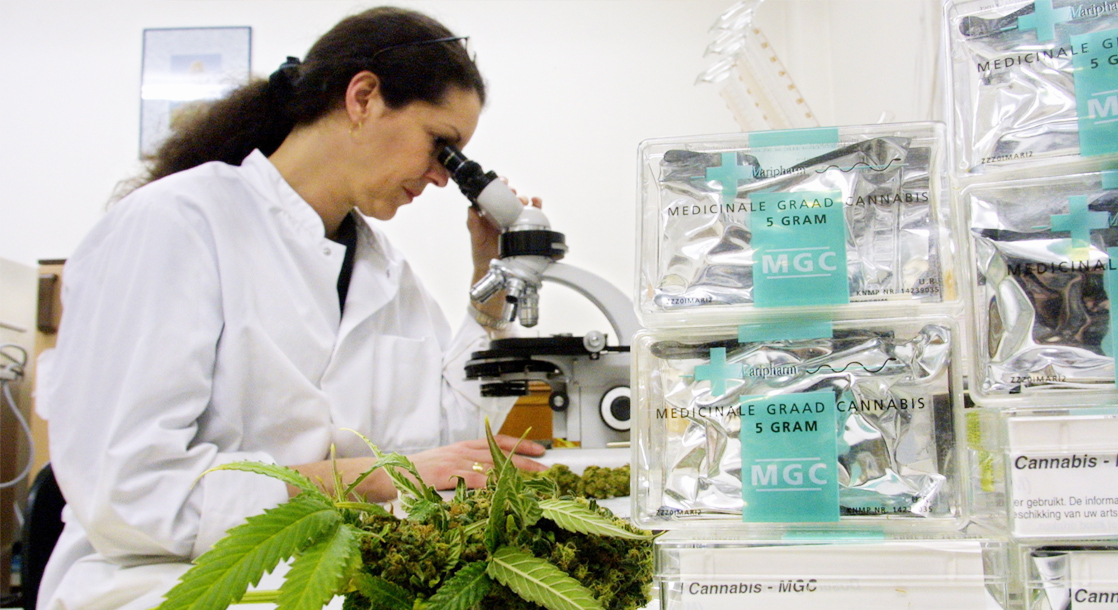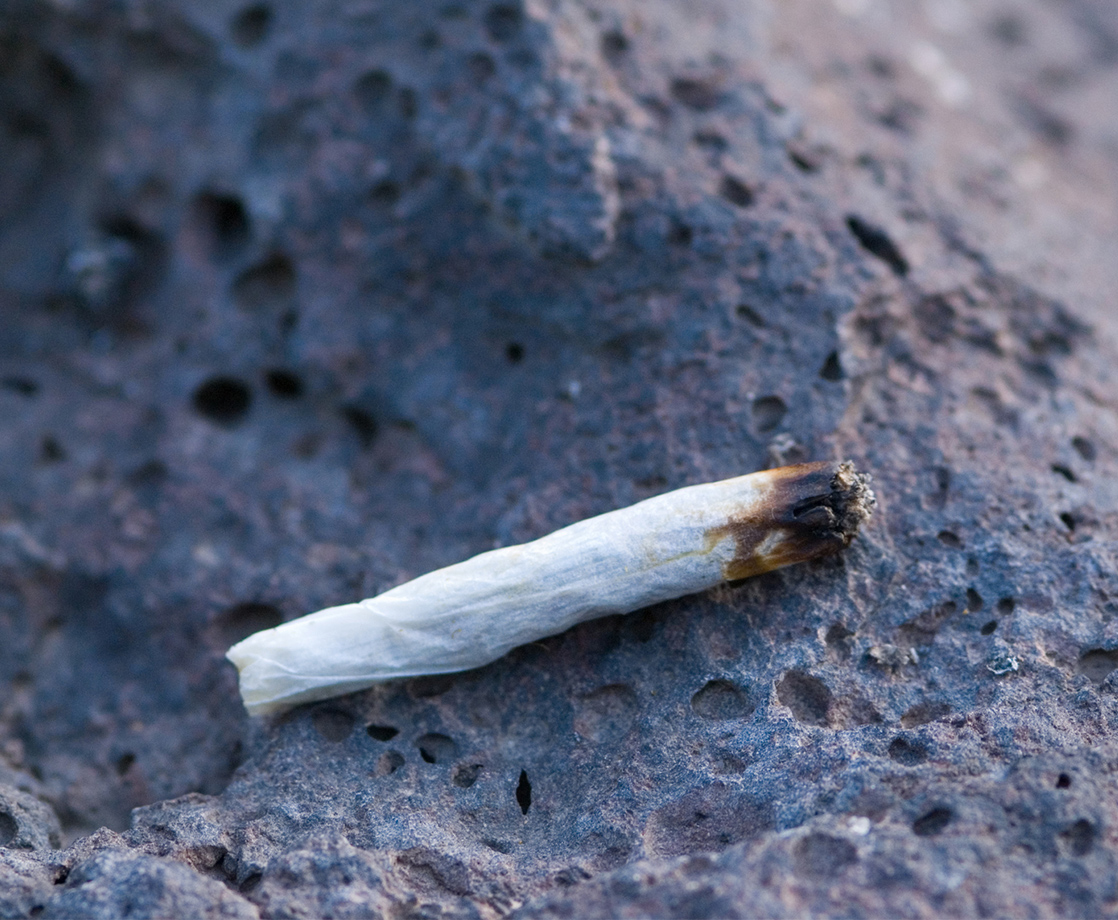Mowgli Holmes knows what he wants. When I call him, he quips almost immediately: “What I want to happen is for Snoop to come to my lab, put on a white lab coat and orange safety goggles, and smoke a gigantic joint in front of the DNA sequencer. That’s what I want to happen.”
It’s a PR stunt the biotech cannabis labs could use. Theirs has been a weathered brand.
“Everybody’s first reaction when they hear we are a cannabis lab company is we want to steal their shit and sell it and patent it to Monsanto,” Mowgli, Chief Scientific Officer of Phylos Bioscience, reveals. “The cannabis world is not very comfortable with the word biotech. We’re a biotech company, that’s all it means; we study DNA, and we study how genes work, and there’s so much good stuff you can do with that. We’re never gonna do genetic modification on cannabis.”
Instead, Mowgli, and other cannabis scientists, are studying the plant for the sake of good science. Figuring out how the information gleaned can be used to further the nascent cannabis industry.
Still, a skepticism remains: “I think it’s surprising for the cannabis industry people to meet us and learn we are the good guys,” Mowgli says.
Reggie Gaudino, Vice President of Scientific Operations and Director of Intellectual Property and Genetic Analysis at Steep Hill Labs, has found the same.
“Here is the issue: we came out with the sex test last year,” Reggie explained. His lab had obtained a unique DNA sequence for the male cannabis plant. “Now we have CBD, THC and other tests. You would think people who can make your job easier, and make you do your job better, would be people you would embrace and support. Instead, because the cannabis industry came out of the underground, it’s very paranoid and untrusting.”
When Steep Hill came out with their sex test in 2015, certain websites accused the laboratory of underhandedness. Alarmist articles accused Reggie of evil goals for simply stating what he believed to be the truth.
“The cannabis industry in the United States is playing ostrich,” he insists.
“They are ignoring the fact that within a very short period of time the likes of big tobacco, Big AG and Big Pharma will be here and will be making significant noise. Everyone thinks if we just pump out all the sequences, they won’t be able to patent anything. That is completely false. Or if we make everything open-source, they won’t be able to patent it. That is completely false. The reality is you’re just making it easier for them, because they have billions of dollars. They will take all of those strains and they have PhD level employees who do exactly this stuff. They would create all sorts of new and wonderful strains in a very short period of time.”
Despite the deep-seeded mistrust, the industry is warming up to the friendly cannabis scientists. In California, Reggie cannot legally hold a grower’s license. He therefore works with third party growers. Reggie’s partnership resulted from an unlikely friendship.
“It was a guy who called me a thief a year before,” Reggie recalls. “He told me to my face, nose-to-nose, yelling at each other, that I was just trying to rip off all the guys who did the real work in the cannabis industry; now, a year later, we are the best of friends. He realized I wasn’t try to steal anything. I was trying to help the industry so people like Monsanto would not come and steal.”
Mowgli grew up in the woods of Oregon, where he learned to “hate” firms that depend on patents like Monsanto: “We know all their science, and we’re using it, but our politics are very different and I think that is a surprising thing for the cannabis industry people to realize – that there is a science company and it doesn’t mean they’re evil. It’s a constant battle explaining why science is okay.”
A marriage of bio-tech and cannabis has implications for both the recreational and medicinal sectors. The cannabis scientists apply advanced biological techniques that have not, historically, been available to researchers of the plant.
Genetic information about the cannabis plant was not available until 2011 when a Jonathan Page led team published the first strain sequences. Shortly thereafter, Kevin McKernan’s team published another set of sequences.
Reggie’s lab has partnered with Nolan Kane’s group at the University of Colorado Boulder and The Cannabis Genome Research Initiative (CGRI), and together have about 70 strains sequenced. Kane’s group already had 68 samples sequenced using a short read sequencer. Reggie’s lab offered the first male long read cannabis sequence, a tool much needed to create a high quality reference genome.
He believes, once the various cannabis labs adopt a collaborative approach, which they’ve yet to fully do, “we will have enough data to do anything you really need to do.”
They want to make breeders, who currently operate in the dark compared to growers in other industries, better at what they do. The scientists will profit by selling CBD, THC and other tests to breeders. They can analyze DNA sequences and genetics of cannabis strains. That means seed to flower analysis, and chemical analysis on the genetic leafs to look at THC or CBD or one of the terpenes and determine how to achieve maximum production of whatever trait a breeder wishes to accentuate.
Say a breeder has thousands of seeds, and they want to select for a particular trait. A cannabis scientist can help them look for the best male and female seeds to use in order to maximize the desired trait. In terms of speeds and efficiency, the cannabis scientists have sped the process of identifying which seeds had which traits from six to nine months to two weeks.
By force flowing and breeding at two or three months, and using marker assisted breeding, the result is three to five generations a year with the cutting edge technologies used by Steep Hill and others.
Significantly, “stable phenotypes can now be achieved at the 2 year mark, instead of at the 5-8 year mark,” Reggie explains.
Historically, breeders have selected for higher highs, vibrant colors and scents. Whilst the beer and wine industries have strict standards about what’s going into the product, however, in the cannabis industry, few know what they’re receiving.
“It makes it a crapshoot every time,” Mowgli lamented.
The goal, therefore, is to “catalogue all the existing diversity that is out there,” he says, and then support that diversity.
As Mowgli describes: “We want the plant to just branch out and be as interesting as it can. In order for that to happen, we need a diverse craft based industry, instead of big AG monoculture type industry, and we think we can support that by cataloguing what’s out there and encouraging people to grow weird stuff and tell them how it’s related to grows historically.” Reggie foresees similar.
“It will all be about the niche varietals, such as the special hop varietals that give you a specific craft beer, or special grape varietals that gives you niche shirazs,” he imagines. In cannabis, the focus might not be on hops and grapes, but, terpenes and cannabinoids.
While it might seem intuitive to think cannabis production has been stunted thanks to its Schedule I narcotic status, at least one scientist sees it differently.
Mowgli believes the nature of the clone sharing economy “and the underground obsessive nature of it” produced better cannabis varieties than were produced by the wine and hops industries. Growing unlawfully, cannabis growers oft were forced to remain small so as to remain under the radar. Primitive techniques no hurdle, an obsession with the plant fueled creativity and experimentation. The goal was to get higher and higher. That farms were small also played a role, Mowgli believes.
“They have done incredible work in the last fifty years,” he credits cannabis growers. “Working in their basements, they took this stringy hemp like weed of a plant and made it into this insane production vehicle for THC. And they’ve made a lot of variations on that; they did amazing work.” Mowgli hopes that, in the face of monoculture-practicing corporations, the cannabis industry can protect the diversity, and therefore the integrity, of the plant.
“When growing at a massive scale you need plants to be the same and not quirky,” Mowgli details. “When you’re growing on a small farm you can grow ‘Girl Scout Cookies’, which have an unusual nutrient need, because you are a craft grower and can specialize in that.” It’s this sort of focus on plant diversity he believes could save the small growers who grew the strains of today.
The cannabis scientists believe this can be helped along by cataloguing what strains are currently out there and to encourage people to try “weird stuff”. By knowing what’s out there today, the experimenters can better understand the plant.
“We can start helping breeders make incredible new varieties,” Mowgli excitedly envisages. “We’ve never done professional breeding with cannabis. In the past, the best breeders were operating under crazy conditions. I feel like we are on the verge of an explosion of diversity if we do it right. Or, if we do it wrong, there will be a few mega-corporations making blue dream.











